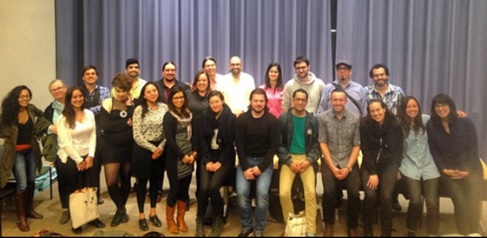Settler Colonialism Panel Assesses Growing Field

On April 14th, members of the Yale Group for the Study of Native America returned to Luce Hall’s Auditorium for the two-hour panel, “Historicizing Settler Colonialism: From Wisconsin to Palestine.” Organized between YGSNA, Yale’s Council on Middle East Studies, and the American Studies Program, the discussion was chaired by Professor Rosie Bsheer of the Yale History Department. It included Steven Salaita (Independent Scholar), Doug Kiel (Williams College), and Yale faculty members Dan Magaziner (History) and Ned Blackhawk (History and American Studies).
Assessing the rise of settler colonial studies and examining its application in a range of comparative settings, this panel queried the logics of colonial settlements in Palestine, the rise of anti-sovereignty movements in the American Midwest, as well as the history of Indigenous dispossession in South Africa. Each panelist examined the conceptual utilities of the paradigm and together joined audience members in an extended conversation about the transnational dimensions of global colonialism. Salaita examined the mythology of North American settlement in the discoursive imaginary of Israel’s colonization of Palestine, Kiel drew upon his ongoing research into the history of land alienation and reclamation among the Oneida Indian Nation of Wisconsin, and Magaziner provided an extended overview of southern Africa’s comparative regimes of British settler colonization.
Dozens of graduate students (photographed here with the panelists) from across not only Yale’s campus community but also New York City graduate programs attended the event, including nearly a dozen students from Professor Audra Simpson’s “Settler Colonialism in North America” graduate seminar at Columbia University. Such participation continues ongoing sets of conversations and exchanges between YGSNA members and New York City graduate student communities.
Salaita spent the early afternoon at the Native American Cultural Center meeting with graduate students from across campus, discussing his ongoing legal struggles with the University of Illinois’s administration, which terminated his tenured appointment in August 2014.